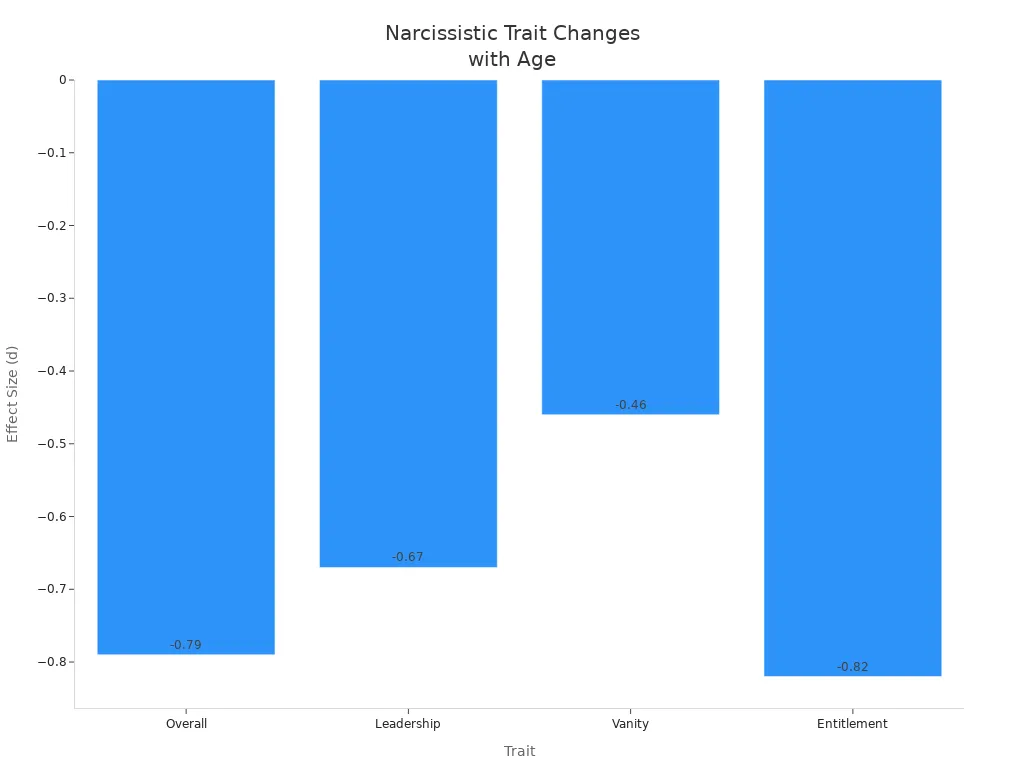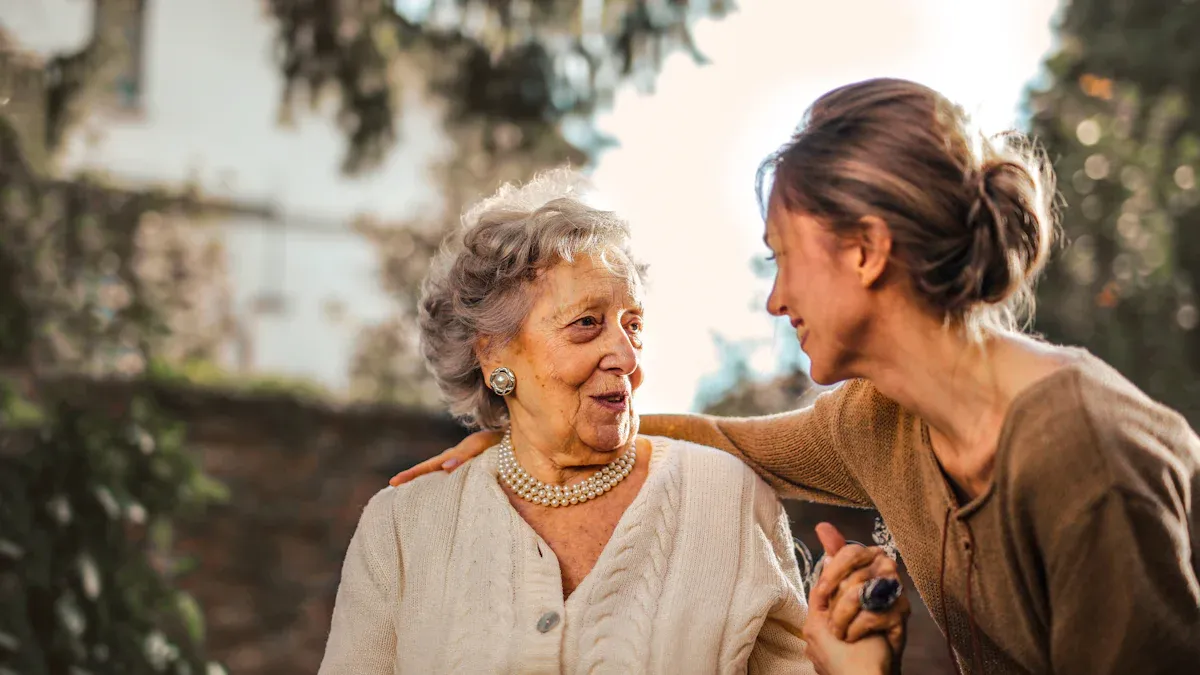Last updated on December 29th, 2025 at 08:57 am
Understand Narcissism in older adults. The aging narcissist faces unique psychological challenges as physical decline and loss of independence threaten their grandiose self-image. While research suggests certain narcissistic traits, such as grandiosity and entitlement, may naturally decline with age, narcissism in seniors often manifests differently rather than disappearing. An elderly narcissist may become more hostile, more self-centered, and more inflexible when confronting age-related limitations, desperately clinging to past achievements while struggling with their need for constant admiration.
For families and caregivers, narcissist aging presents exceptional difficulties. The aging narcissist typically must be the center of attention, often feels slighted or mistreated, and only values others for what they can provide. Combined with potential cognitive decline, these behaviors intensify caregiving challenges, creating emotionally draining relationships where empathy remains absent and demands escalate.
TL;DR
Narcissism in older adults often means they focus on themselves. They may want others to admire them. Noticing these traits helps you understand their actions.
Most narcissistic traits get weaker as people get older. Some traits might stay the same. Knowing about these changes helps you talk to them better.
Watch for behavior patterns like acting very important. Also look for not caring about others’ feelings. One-time actions do not always mean there is a big problem.
It is important to set clear boundaries with narcissistic traits. This keeps you safe and helps your relationships stay healthy.
Caregivers need to take care of themselves. Taking breaks and asking for help can stop burnout. It also helps your mind stay healthy.
Try to help older adults join social activities. Being alone can make narcissistic traits worse. Kind encouragement helps them feel part of a group.
Here is a simple chart that shows how personality disorder rates change with age:
Age Group | Prevalence (%) |
|---|---|
65–74 years | 13.2 |
75–84 years | 10.4 |
85+ years | 10.7 |
Knowing about these changes helps you care for loved ones. It also helps you see when someone might need help.
Narcissism in Older Adults

What It Is
You might wonder what narcissism looks like in older adults. This means someone often thinks about their own needs first. They want others to admire them.
They may feel they should get special treatment. These traits can show up in different ways. Experts use certain signs to diagnose narcissistic personality disorder.
Here is a table with the main signs doctors check for:
Diagnostic Criteria for Narcissistic Personality Disorder |
|---|
Grandiose sense of self-importance |
Obsessed with fantasies of unlimited achievement or success, beauty, love |
Believes they are “special” and should only associate with other high-status people or institutions |
Requires excessive admiration |
Has a sense of entitlement or has unreasonable expectations for favorable treatment |
Is interpersonally exploitative, often takes advantage of others to achieve personal success |
Lacks empathy toward others |
Is often envious of others or believes others are envious of him or her |
Shows arrogant, haughty behaviors or attitudes |
You might see some of these traits in older adults. Not everyone who acts this way has a disorder. Sometimes, these behaviors are hard to notice. You may hear them talk about their achievements. They might expect others to meet their needs.
How It Shows Up
Narcissism in older adults can show up in daily life. You may notice these behaviors:
Feeling very important
Wanting others to admire them all the time
Thinking they deserve special treatment
Always thinking about power, fame, or beauty
Not caring about how others feel
Putting others down or bullying them
Getting very angry when criticized
Some older adults may act more selfish or angry. You might see them refuse to change their routines. They may want praise all the time or act arrogant. Sometimes, they do not understand other people’s feelings.
Tip: If you notice these patterns, watch how often they happen. Being proud or stubborn sometimes does not mean someone has narcissism in older adults.
Changes With Age
You may wonder if narcissism changes as people get older. Research shows some traits get weaker with age. For example, people may care less about looks or being in charge. Entitlement often goes down too. Here is a chart that shows how these traits change:

Trait | Mean-level Change | Effect Size (d) |
|---|---|---|
Overall | Decrease | -0.79 |
Leadership | Decrease | -0.67 |
Vanity | Decrease | -0.46 |
Entitlement | Decrease | -0.82 |
Most people show less narcissism as they get older. Some traits do not change much. Studies say narcissism stays about the same over time. The worst forms, like being very sensitive or stubborn, usually get better.
Health problems and losing independence can change these traits. When older adults lose independence, they may get angry or refuse help. Being alone can make them feel sad. Some may feel anxious or upset because they miss attention. Memory problems can make these behaviors worse. You might see more anger or resistance toward caregivers.
Health Factor | Impact on Narcissistic Traits |
|---|---|
Loss of independence | May increase anger or resistance |
Social isolation | May lead to depression |
Common Misconceptions
Note: Many people think narcissism in older adults always gets worse. Studies show most traits actually go down. Some believe only men act this way, but women can too. Experts say not every stubborn or proud older adult has narcissistic personality disorder. You should look for patterns and see how these traits affect relationships.
Signs and Behaviors
Knowing the signs of narcissism in older adults helps you spot patterns. It also helps you respond with kindness. You may see certain actions that stand out every day.
Key Traits
Grandiosity
Some older adults talk about their achievements a lot. They might think they are more important than others. This grandiosity shows up when they want praise. For example, they may say their opinions matter most at family events.
Entitlement
Entitlement means wanting special treatment. An older adult may expect others to meet their needs. You might hear them say, “I’ve earned this,” or “People should respect me.” This trait can make them upset when things do not go their way.
Lack of Empathy
You may notice they do not care about others’ feelings. An older adult with narcissistic traits might ignore your emotions. They focus on themselves and rarely comfort others.
Tip: Look for patterns, not just one-time actions. Everyone can act selfish sometimes. But if it happens a lot, it could be a deeper problem.
Personality traits most strongly linked to narcissism in older adults include:
Agentic narcissists: Feel grand or superior and crave admiration.
Antagonistic narcissists: See others as rivals, exploit others, and lack empathy.
Neurotic narcissists: Feel insecure, shame-prone, and react strongly to criticism.
Behavioral Patterns
Manipulation
Manipulation happens when someone tries to control others. You may see an older adult use guilt or flattery to get their way. They might twist facts or play people against each other.
Sensitivity
Older adults with narcissistic traits react strongly to criticism. You might see anger, denial, or even tears if you question them. This sensitivity makes honest talks hard.
Withdrawal
Sometimes, an older adult pulls away from family or friends. Withdrawal happens when they feel misunderstood or unappreciated. You may notice them spending more time alone or refusing help.
People with narcissistic personality disorder often have a big self-image. They feel entitled and do not care about others’ feelings. They see themselves as special and think only similar people understand them. This self-focus makes it hard to connect with others. They want admiration and may use others. They can feel jealous of people who have more.
Overt and Subtle Forms
Narcissism in older adults can be easy or hard to spot. Overt narcissism is clear with grandiosity and entitlement. You might hear bold claims or see demanding actions. Subtle forms, called covert narcissism, look different. These people may act passive-aggressive or play the victim. They often share stories about being mistreated and use self-pity for sympathy.
Here are some differences:
Overt narcissists: Show grandiosity and entitlement openly.
Covert narcissists: Use passive-aggressive actions and victim mentalities.
Aging covert narcissists: May become more isolated, develop rigid thinking, and focus on self-pity.
Type | Common Behaviors | Example Scenario |
|---|---|---|
Overt Narcissism | Boasting, demanding attention | Insisting on being the center of family events |
Covert Narcissism | Victim mentality, self-pity | Sharing stories of unfair treatment, withdrawing from social activities |
Note: Recent studies (2012–2025) show covert narcissism goes up with age. This leads to more isolation and rigid thinking. Experts say you should watch for both overt and subtle signs to understand the full picture.
Causes and Factors
It helps to know why narcissism in older adults happens. These traits do not show up all at once. They grow slowly from many things. Psychology, social life, and biology all matter.
Psychological
You might wonder what goes on in the mind as people age. Many things can shape or keep narcissistic traits strong:
Identity Threats: Getting older can change how someone sees themselves. Losing strength or memory can make them feel less important. This can make them focus more on their own needs.
Reliance on Family Support: Some older adults find it hard to ask for help. They may feel embarrassed or weak. This can make daily life tough and cause frustration.
Stability of Narcissistic Traits: Narcissistic behaviors can last for years. These patterns can cause fights in families. Over time, loved ones may stay away, and the person feels alone.
Other health problems can also change these traits. For example:
People with both narcissism and dementia may act more demanding or critical.
They might not admit their memory loss or get mad if you mention it.
Manipulation can get worse if their judgment is poor.
Losing independence can make these traits stronger.
Confusion or agitation may cause more outbursts or controlling actions.
Social and Environmental
Where someone lives and who they talk to can shape behavior. Studies show older adults with strong narcissistic traits keep a steady mood with close family or friends. They want support and praise from these people. But when talking to strangers, their mood can drop fast if they do not get attention. This shows how much relationships matter.
Loneliness, losing friends, or moving can make narcissistic behaviors worse. If older adults feel ignored, they may act out to get noticed. Stressful events, like moving or losing a spouse, can also trigger these traits.
Biological
The study, “Narcissistic and Borderline Personality Disorder: Relationship with Oxidative Stress,” published in March in the Journal of Personality Disorders, found that high levels of the molecule 8-OH-DG, an oxidative stress biomarker, were similar in people with NPD and Borderline Personality Disorder (BPD). This means there may be a biological link between oxidative stress and narcissistic traits in older adults.
You may not see these changes, but they can affect mood and actions. Health problems, changes in the brain, and some medicines can play a role. Experts are still learning how biology affects personality as people get older.
When you look at all these things together, you see narcissism in older adults is complicated. Struggles in the mind, changes in social life, and shifts in biology all matter. Knowing this can help you care for loved ones with patience and understanding.
Relationships and Daily Life
Family Impact
Emotional Strain
Living with an older adult who has narcissistic traits can be tiring. They often want more attention and special treatment. Sometimes, they use health problems to get sympathy or control. You might feel guilty when they ask for help. They may get angry if they feel ignored. These actions can make the family feel stressed and worn out.
They sometimes put others down to feel better.
You might hear them talk a lot about what they did in the past.
They may change stories to seem like victims.
If they cannot control someone, they might stop talking to them.
Long-term partners can feel stuck or guilty as care needs grow. This can cause burnout and make people feel very tired. Children may feel ignored, manipulated, or criticized. These things can lead to anxiety, sadness, and trouble making healthy friendships.
Communication Issues
Talking with an older adult who has narcissistic traits can be hard. They might use guilt or sneaky comments to control talks. Sometimes, they play family members against each other to cause problems.
Tip: Try to keep talks simple and clear. If you feel caught in the middle, remember you are not alone. Many families deal with these problems.
Family roles can change in these situations:
The Fixer: You may feel you must solve problems and keep peace.
The Peacemaker: You might try to calm everyone down.
The Scapegoat: Sometimes, you get blamed for problems.
The Golden Child: You may feel pressure to do well and stay favored.
Caregiver Challenges
Boundaries
Caring for an older adult with narcissistic traits can be hard on your feelings. You need to set boundaries to protect yourself. Boundaries help you stay healthy and keep relationships safe.
Emotional boundaries
Time boundaries
Physical boundaries
Material boundaries
Be clear and short when you set limits. Use praise to encourage good behavior. Stay patient and know that change takes time. If dementia is there, let the person help set boundaries so they will work with you.
Avoiding Over-Involvement
You may want to fix every problem or give constant attention. This can make you feel burned out. Take care of your mind by taking breaks, doing hobbies, and getting help from friends or experts. Remember, you cannot fix everything by yourself.
Note: Caregivers often face abuse or manipulation. Getting breaks and professional help is important for your health.
Social Effects
Older adults with narcissistic traits may have trouble with friends and groups. Trust issues can make it hard to keep friendships. Sometimes, their actions make others doubt them.
Social Consequence | Explanation |
|---|---|
Trust issues in relationships | Hard to make and keep friends because of distrust |
Societal mistrust affecting community engagement | Real efforts to connect may be doubted by others |
You may see them stop joining social events or become alone. These actions can hurt their happiness and sense of belonging. If you see these changes, gently encourage them to join in and get support.
Coping and Management

For Families
Setting Boundaries
It can feel hard when an older adult tests your limits. Setting boundaries keeps you safe and healthy. Boundaries show others what you will and will not allow. You must be clear and stick to your rules.
Why do boundaries matter?
Boundaries stop emotional hurt. They also show the older adult what is not okay. You cannot change their actions, but you can choose your reaction.
How can you set boundaries?
Say your limits in simple words. For example, you can say, “I will not accept yelling.”
Tell them what happens if they cross the line. Explain what you will do.
Keep your rules the same every time. This helps stop fights.
Tip: You do not have to give reasons. Short answers are best.
Key boundary strategies:
Talk less or only about simple things.
Change what you expect. You cannot change their personality.
Focus on what you can do. You control your actions.
Boundary Effectiveness Table
Boundary Technique | Why It Works | Expert Consensus (2020-2024) |
|---|---|---|
Consistent enforcement | Deters future violations; builds respect | Strong consensus |
Clear communication of consequences | Reduces disputes; sets expectations | Strong consensus |
No negotiation on boundaries | Prevents repeated violations | Strong consensus |
Experts say boundaries work best if you use them every time. If you let things go, the older adult may test you more.
Self-Care
Taking care of yourself is not selfish. You need to stay well to help others. Many caregivers forget about their own needs. This can make you feel tired and sad.
What does self-care look like?
Take breaks. Ask friends for help or use respite care.
Keep up with friends. Spend time with people who care about you.
Talk to a therapist. Sharing your feelings can help.
Write in a journal. This helps you understand your thoughts.
Note: Your happiness is important. The relationship may feel unfair. You must take care of yourself.
Self-Care Practices Table
Practice | Benefit | Research Citation (2015-2023) |
|---|---|---|
Respite care | Prevents burnout; restores energy | JAMA Psychiatry, 2018 |
Social support | Reduces stress; improves mood | Gerontologist, 2021 |
Therapy | Builds coping skills; validates feelings | Psychol. Aging, 2020 |
Journaling | Clarifies emotions; tracks progress | Aging & Mental Health, 2017 |
Personal boundaries | Protects mental health | Clin. Psychol. Rev., 2019 |
Conclusion
You can spot narcissism in older adults by looking for patterns. Watch for grandiosity, entitlement, and lack of empathy. Setting boundaries helps you stay safe and healthy. Taking care of yourself is important too. Coping strategies can help you feel better. You may see these changes:
Caregivers feel less stressed and happier
It gets easier to handle tough situations
You understand others and stay patient
There are fewer fights over control
People talk more clearly and argue less
Frequently Asked Questions
What is the difference between narcissism and normal aging stubbornness?
Older people can get stubborn as they age. Narcissism is more than just being stubborn. It means someone needs lots of praise. They do not care much about others’ feelings. They also feel they deserve special treatment. Experts say stubbornness is normal. But narcissism can hurt relationships and daily life much more.
Can narcissistic traits get worse with age?
Most studies from 2012 to 2025 say these traits usually get weaker with age. Some traits, like entitlement, might stay the same or even get stronger. This can happen if health gets worse or someone loses independence. Experts say changes depend on life events and support from others.
| Trait | Tends to Change With Age | Citation |
|---|---|---|
| Grandiosity | Goes down | Psychol. Aging, 2020 |
| Entitlement | Might not change | JAMA Psychiatry, 2018 |
| Sensitivity | Can go up or down | Aging & Mental Health, 2017 |
Is narcissism linked to dementia or other health problems?
New studies show there can be a link. Dementia can make narcissistic behaviors worse. Memory loss and confusion may cause more anger or manipulation. Experts say to watch for sudden changes. If you see new or bad symptoms, talk to a doctor.
Can narcissism in older adults be treated?
Therapy can help manage narcissistic traits. Cognitive-behavioral therapy (CBT) works best for many people. Support groups and counseling help families too. Experts say treatment can help people talk better and feel less stress.
What resources are available for families and caregivers?
You can get help from mental health clinics, online groups, and caregiver organizations. Many hospitals offer counseling and respite care. Experts say to use trusted sources and ask your doctor for advice.
| Resource Type | Example | Citation |
|---|---|---|
| Support Group | AgingCare.com | Gerontologist, 2021 |
| Therapy | Licensed counselor | Clin. Psychol. Rev., 2019 |
| Respite Care | Local senior center | JAMA Psychiatry, 2018 |
